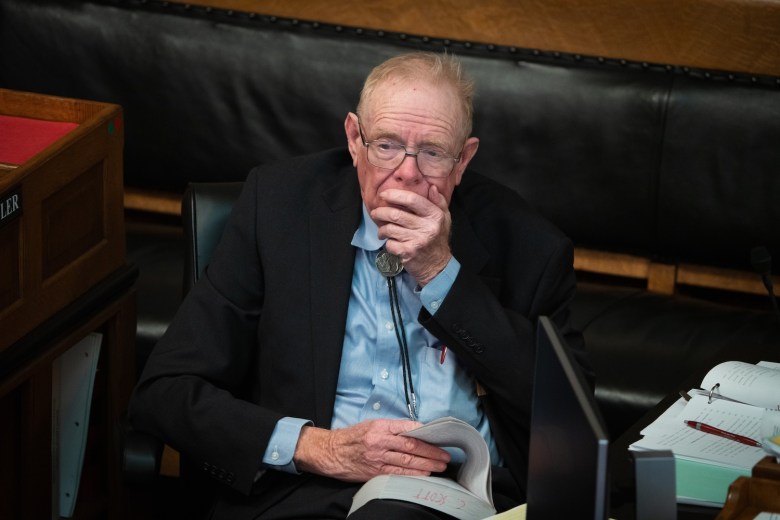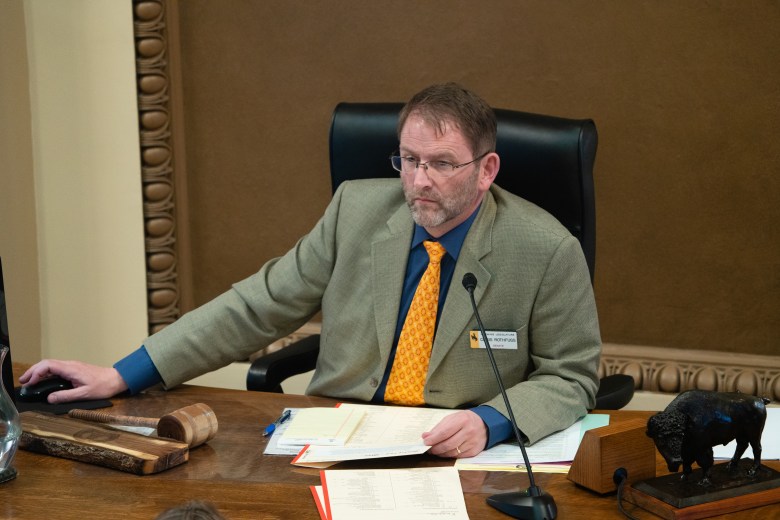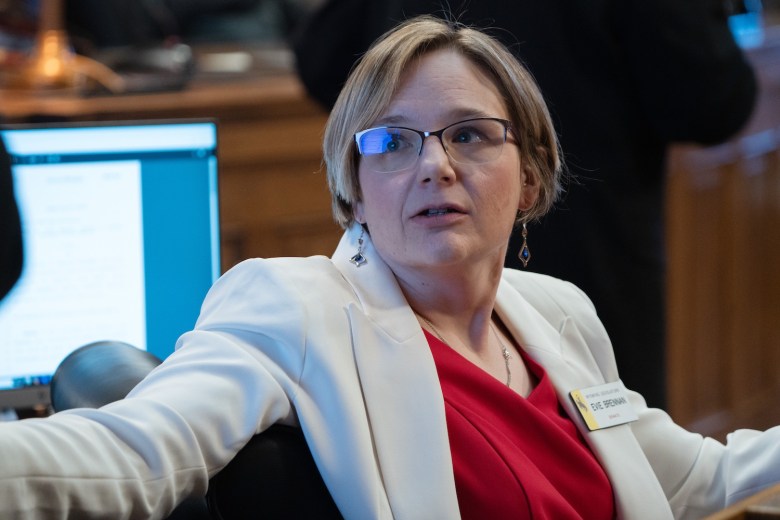Despite attempts to dismantle them, universal school vouchers remained intact when the Wyoming Senate passed House Bill 199, “The Wyoming Freedom Scholarship Act” on Wednesday.
As now constructed, the program created by the bill would give up to $7,000 per child to any Wyoming family, regardless of income, for non-public school expenditures like tuition for their pre-K through high-school students.
The Senate’s vote of 20-11 to pass the bill on third reading clinched a victory for school-choice activists who want to see all Wyoming parents given a chance to seek alternative education, like private or parochial school, for their students. But it came amid a flood of constituent comments on the bill, lawmakers reported, many of them adamantly opposed to a measure many see as a flagrant violation of the Wyoming Constitution.
“I have been overwhelmed by the emails that I’ve received from my hometown,” Casper Republican Sen. Bill Landen said. “And they run, easily, 10-to-1 against this bill.”
Landen, who voted no, also questioned the urgency of the bill when Wyoming already has an education savings account program that is not even 2 months old. That program gives funds to income-qualified families for non-public-school expenses.
“I’m not quite sure why on this issue the Wyoming Senate feels the urgency to have the accelerator all the way to the floor, with no guardrails, going 100 miles an hour,” Landen said. “And that’s what it feels like we’re doing here.”
Sen. Charlie Scott, another Casper Republican, said there is a reason for haste.
“I see an urgency in getting started on this bill,” he said. “We’ve got too many kids that are being left behind by our current K-12 system.”

Scott also welcomed litigation to test the constitutional questions. “There’s good constitutional arguments on both sides, and we’re only going to find out by trying it with a real-life case and seeing what the Wyoming courts will say,” he said.
Before the measure heads to Gov. Mark Gordon’s desk, the House has to approve the Senate’s amendments to HB 199 — a process known as concurrence. That could prove challenging, as key differences now exist within the House and Senate versions of the bill.
The effort has drawn national attention, including from President Donald Trump, who lauded Senate President Bo Biteman for helping to advance the legislation.
“This would be an incredible Victory for Wyoming students and families,” Trump wrote on Truth Social. “Every Member of the Wyoming Senate should vote for HB 199. I will be watching!”
Long and winding road
House Bill 199 would transform and expand an existing state education savings account program that gives public money to income-qualified families to help them pay for pre-K programs, homeschooling or private school tuition. The education savings account was passed last year.
Version 2.0 would offer up to $7,000 per student regardless of a family’s economic needs. The bill’s sponsor Rep. Ocean Andrew, R-Laramie, brought it to ensure all families have access to school choice, he said.
Along with making the program universal, in its originally introduced version, the Freedom Scholarship Act bill dropped the preschool component, a requirement that participating students take statewide assessments or similar nationwide tests and a requirement that providers be certified by the Department of Education.
Making it universal has been a major sticking point. That’s because, as Sen. Chris Rothfuss, D-Laramie, has repeatedly pointed out, it runs counter to the Wyoming Constitution.
During the Senate Education Committee’s discussion of the measure, Rothfuss read aloud from Article 7, Section 8: “Nor shall any portion of any public school fund ever be used to support or assist any private school, or any school, academy, seminary, college or other institution of learning controlled by any church or sectarian organization or religious denomination whatsoever.”

That’s not the only provision that causes concern. When Gov. Gordon partially vetoed the education savings account bill last year, he pointed specifically to constitutional concerns when he narrowed eligibility to families at or below 150% of the federal poverty level. That referenced the constitutional language that prohibits the state from giving money to individuals “except for the necessary support of the poor.”
As House representatives debated HB 199 in January, several made repeated attempts to reinstate pre-K, assessment requirements, certification and income requirements, as well as tweak other aspects of the bill. Many also pleaded for their colleagues to just let the education savings accounts, which launched in January, actually roll out to observe how it goes.
The vast majority of the amendment attempts in the House were roundly defeated, though the certification process was reinstated. The Freedom Caucus, which enjoys a majority in the House, helped push the bill through the body largely unchanged with overwhelming support.
When it came to the Senate, attempts were again launched to transform the measure, this time more successfully. Members of the Senate Education Committee tightened up the certification process language, reinserted language to require a statewide or nationally normed assessment for students and changed the name of the account to the “Steamboat Legacy Scholarship Act,” a nod to the recognizable bronc rider.
When the bill hit the Senate floor Friday, Sen. Wendy Schuler, R-Evanston, proposed an amendment to reinstate the tiered-income qualification, arguing that it was the only way to prevent Wyoming from being sued.
“As much as we like lawyers, I don’t think we want to see a lot of our bills get hung up in court,” Schuler said.
That amendment passed by a single vote, 15-14.

When the body reconvened for a second reading on Tuesday, however, the tide turned again. Sen. Evie Brennan, R-Cheyenne, proposed an amendment to take it back to a universal program. Her amendment passed.
During the same discussion, Rothfuss proposed reinstating the pre-K component. The body also passed that.
What they said
On the Senate floor Wednesday, lawmakers made heartfelt pleas for and against the measure. Many acknowledged that an unusual amount of constituent comments has poured into their inboxes and voicemail boxes.
Sen. Ed Cooper, R-Ten Sleep, said a potential decline in enrollment spurred by this measure “is very hurtful” to the small schools in his district. “We’re putting out some really good students in my area. I’m proud of our schools and I stand by them.”
Sen. Jared Olsen, R-Cheyenne, said he believes school choice and the health of public schools aren’t mutually exclusive. Regarding feedback, he said, “The bill is not the same as it was when it came into the House. We did put assessments as a guardrail back in and tightened the certification. Keeping pre-K improves the bill as well.”
Rothfuss, meanwhile, reiterated that giving money to families indiscriminately will not pass constitutional muster.
“If it’s inequitable, it’s unconstitutional when we are talking about education funding,” he said. “That’s always how it’s going to be.”



Since the so called Freedom caucus so badly wants to combine church and state, why don’t they start taxing their churches to fund their ideas? Rather than dismantling public education to achieve their goals.
I cannot comprehend how any legislator who takes an oath to support, obey and defend the Constitution of the State of Wyoming could vote for this bill. Using taxpayer money to fund private and religious education is clearly unconstitutional. In addition, the non-public education funded by this bill would be unregulated, and in many cases, second-rate and substandard at best. If this bill proceeds through the session and is signed into law by the governor, it will almost certainly be challenged in the courts and quickly rejected, since the language in the Wyoming Constitution is quite clear and unambiguous. More taxpayer funds will be used to defend the statute in the courts, and in the end it will go down in flames. What a legacy of incompetence and failure for this Legislature and the Freedom Caucus!
Thenk you for your continued excellent reporting WYOFILE!
I am VERY opposed to this legislation, as a parent, former educator of almost 4 decades, a taxpayer, and a property owner. I throughly agree with what has already been stated, and am curious to know, how was the sum $7000 calculated for each child selecting not to attend public school?
(I know at the beginning of each school year, I would have been elated to have $7000 for each of my children every year!!)
So, am I correct in understanding that a family of 4 choosing to home school just
collects a nifty $28,000? Sweet deal!
How was that amount decided???
I fully admit there are families genuinely committed to home schooling their kids, HOWEVER, I can see a golden opportunity to fraudulently abuse the system with my tax $ and something I believe is against the
Constitution. If one chooses private education, pay for it yourself!!!
For my money, I would rather support a strong public education system .
Excellent reporting again, Katie Klingspron. Thanks!
As a Wyoming voter since 1976, a WY public school teacher for 15 years; tribal and community college instructor and UW Educational Opportunity Coordinator for 15 years I have very negative professional opinions on HB 199. As a woman with no children, I have personal misgivings as well having endured outlandish property tax and embedded educational tax increases for 36 years that I’ve disputed recently and loudly.
Primarily, my rejection of HB 199 centers on further splintering of “public” services. Seems to me the Freedom Caucus wants each service intended for the public-at-large to be available to and state-supported by every sub-group as well. Clearly, this is unmanageable and non-fundable.
Public means for the whole not for each sub-group. Sub-groups make decisions to endorse their flavor of “education” while public school access is available to ALL. Freedom Caucus and other special interests need to support themselves since “public” services forbid such isolationist pedagogies.
So simple folks…if you don’t want what’s available to all, pay for it yourself.
This is the opposite of Wyoming’s culture of “pull yourself up by your bootstraps.” The Freedom Caucus plans to create a new pool of welfare recipients – no matter what color of lipstick they want to paint on this pig. When I discovered the youngest of my three sons had a learning disability and would benefit from private instruction, I enrolled him at a private school which I paid for myself. My children and I sacrificed a lot of things so my youngest could have what he needed. I didn’t buy a new car for a decade, didn’t take my children on vacation, didn’t buy expensive things for my boys, didn’t go out to eat, didn’t have new clothes, but spent my money on my son’s needs. I also got a second job to help with this expense. I’m not bragging or calling myself a hero, but if an everyday Mom like me can budget and give up luxuries, so can others.
But this is more than providing an alternative. Folks, the Freedom Caucus is pushing a religious, not educational, agenda. Creating private church schools to indoctrinate the next generation with their brand of “christianity” is their goal. But which type of christianity are they promoting? The one used by southern enslavers to tell slaves “to obey their masters?” The one followed by Bull Connor who taught church school on Sunday, then sicced attack dogs on peaceful protestors during the week? The one that provided Nazi soldiers with belt buckles that proclaimed, “Gott Mit Uns”, God is With Us, as they herded people into Auschwitz? And don’t expect Freedom Caucus created private schools to let you see their educational propaganda, which they want you to pay for with your tax dollars. We already know they would scream to the heavens that questioning their instructional materials would violate their “freedom.” We can, of course, sit back and do nothing, say nothing, protest nothing, and then be surprised when our tax bills have a new special category – church tax.
agreed. obviously these Freedom Caucus folks have chosen to completely disregard the thoughts and opinions of their constituencies.
By passing through the Wyoming Senate, HB199 offers a small relief to parents who choose to request it to offset non-public school costs for their children. This issue has been debated all over the United States since I was a child in Michigan non-public schools starting in 1960. My parents were never wealthy, but valued quality education deeply, nor was I when my children moved into non-public schools. Sadly, the quality of public schools has never been universally assured, so the choice to send children to non-public schools has been a Godsend. My schools and those of my children were quite diverse in beliefs and color. The voucher amounts have varied widely over the years and across various states. Those vouchers have NEVER amounted to enough money to cover tuition, yet people who send/sent their children to non-public schools have been assessed higher and higher property taxes to pay for public education. The bill actually does little to ameliorate that inequity.
“Those vouchers have NEVER amounted to enough money to cover tuition, yet people who send/sent their children to non-public schools have been assessed higher and higher property taxes to pay for public education. The bill actually does little to ameliorate that inequity.” You want to talk about inequity, what about all the taxpayers that are childless, or the couple that has 1 child and another couple that has a dozen. Life has never been fair…..get over it. I have no issue if you want to send your child to a private school or home school em, but I will not subsidize your choice with my tax dollars.
There is so many problems with these bills:
1 – Money going to religious schools (against state constitution)
2 – No income guidelines (high income people already have access to private schools of choice, so like in other states, it will most likely be the wealthy that will benefit more than other families).
3 – No accountability to the quality of education being provided. If these schools are exempt from state or national testing, how do the taxpayers know students are actually receiving any education at all? They say the current system is failing too many students (which I also disagree with), but how do they know this? Is it from test results? How will they know private schools aren’t also failing students?
4 – No training or certification requirements for educators. Many parents found out during COVID that “home schooling” is hard because they aren’t trained teachers. If you want to homeschool your child or send to a private school and pay for it yourself, that’s fine and you live with the success or failure of your choice. However, I don’t want my tax dollars going to someone who just wants to collect $7,000/year, not have to fight get get their kid out of bed, make sure they are doing their homework, behaving in school (yes, parenting is hard) and just keep their kid home to sleep and play video games all day. Is this every parent, no, but I guarantee there are parents who are tired of their children (and themselves) being held accountable for the students actions/behaviors etc. and blame the schools system for “failing” them.
Lest we forget, private schools can cherry pick who they accept, meaning that based on aptitude, religion, race, socio-economic status etc. whoever they don’t want is left in public schools (yes, for many pushing for this on a national level segregating schools is the end game). If all the kids with behavior issues or education challenges make up a higher percentage of the public school population, the potential of good and qualified teachers leaving, schools being understaffed there’s a good chance test scores will go down – the Freedom Caucus will have created a self-fulfilling prophecy of why the public education system is failing when they are the ones who dropped the bomb on it.
I’ve always believed that this is going to turn into handout to the rich, a way to segregate schools, destroy educating all Americans, a money grab for scammers and a disaster for all of Wyoming students. I’m just glad I don’t have any kids left in K-12 in Wyoming where they all got a great PUBLIC education, scholarships for college, and well paying jobs OUT of state!
The urgency is, quite simply, the dismantling of public education—a vision that came from the founding members of our democracy. Sen Scott has achieved his vision of painting teachers, public education and schools as “wasteful”. May he, like Mitch McConnell, realize that this destruction will cause upending and demise, a slow sink into ignorance, as he wheels his way out the door of the state he has helped fail.
Jeanne Raney, you hit the bull’s eye. The Republican Party has for many years desired the demise of public education. “Keep em dumb.” seems to be their motto. That way, uneducated voters will keep voting for us regardless of how many freedoms we destroy or how many laws we enact that are blatantly against the public’s best interest.
Just another tax benefit for the wealthy and an attack on our system of public schools.
They’re so eager to fund religious indoctrination and substandard education…. Do they really want to keep Wyoming’s youth ignorant and misinformed? If it keeps them in power, maybe they do.
I disagree with this bill. It is important for students to spend time with students and teachers of all beliefs and all colors.